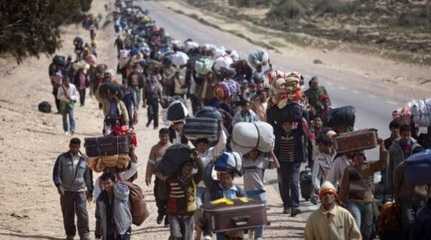
10 August 2022; MEMO: The International Organisation for Migration has said that there are more than nine million migrants and refugees from 130 countries currently living in Egypt.
This figure includes the four main communities – four million Sudanese, 1.5 million Syrians, one million Yemenis and one million Libyans.
The news was reported at the beginning of this week in Egypt's state-run Al-Ahram, which said that the government's generosity and positive attitude towards migrants and refugees may be a pull factor.
"There is a positive discourse by the government of Egypt in terms of welcoming those in need of protection, by initiating or adopting laws and regulations to ensure that migrants and refugees are granted equal footing with Egyptians," IOM told MEMO, "to their access to basic services such as education and health, as highlighted in UN joint common situational analysis (another joint UN study) shared with development partners and the government on 04 July 2022 in Cairo."
"The situation existing in Egypt is encouraging all migrants to integrate in the society, which is a long-term policy by the government, versus creation of camps," IOM continued.
"From our point of view, legal and administrative rules, regulations, and ministerial decrees exist to ensure the integration of migrants, and we discuss with the government how to ensure the full implementation of these existing regulations/decrees where we and other UN agencies such as UNHCR identified gaps on non-application/implementation."
Whilst registered refugees have access to health care and education in Egypt, there are hundreds and thousands of unregistered asylum seekers who need better quality health care and education.
In 2019 the non-profit ACAPS estimated that there were some 350,000 unregistered Syrians alone "who are likely to be in need of legal protection and assistance."
Charities have reported that refugees, asylum seekers and migrants suffer racism and discrimination and one human rights researcher said that in such incidents perpetrators are rarely prosecuted.
In this video recently published on Twitter and viewed almost half a million times, Sudanese children and recent arrivals in Egypt describe their experiences, including being beaten in the street, with one describing how his brother's head was smashed into railings.
In October 2020 a Sudanese child was killed by an Egyptian citizen who had fallen out with his father. Peaceful protests broke out in response and security forces arrested and beat dozens of the demonstrators.
Then in December 2021 and January 2022 police arrested 30 Sudanese refugees and asylum seekers registered with the UNHCR, beat them and forced them into physical labour after they organised a demonstration to protest racism, lack of protection and delays to their resettlement claims.
In March this year, Amnesty International called on Egypt to stop the deportation of Eritrean refugees where they would face torture, arbitrary detention and other ill-treatment after the government deported 31 Eritreans in the space of two weeks.
Last year the Refugee Platform reported that over 200 Eritrean asylum seekers including 44 children were being detained in cramped and overcrowded cells, with little food, access to sunlight or medical care.
In Egypt, dozens of refugees and migrants are held indefinitely and in cruel conditions, Amnesty International said in its 2021 report, some without access to due process or asylum procedures for years.
This has been ongoing since the 2013 coup, after which Syrian refugees were painted as Muslim Brotherhood supporters by government officials, tapping into the animosity prevalent at that time, and accused of being terrorists.
Syrians have been criticised for dominating businesses, stealing Egyptian people's jobs and driving up the price of housing.
"In case of abuses/mistreatment happening based on misunderstanding or lack of awareness of the state policies, the government is committed to develop judicial measures and investigations to protect their regulatory measures," the IOM responded when MEMO asked about the treatment Sudanese, Syrian and Eritrean refugees and migrants had been subjected to.
The Egyptian government has used refugees as a bargaining chip with Europe, promising to stop refugees reaching Europe in exchange for the EU tempering its criticism of the human rights crisis in the country.
In February, during a press conference with his German counterpart, Egypt's foreign minister highlighted Cairo's role in curbing migration to try and deflect attention from human rights which was the focus of the meeting.
In a 2019 report the human rights network EuroMed Rights said: "Whilst Egypt does not constitute a major country of departure for migrant movement towards Europe, the report finds that attention towards EU-Egypt cooperation on migration is predominantly driven by Egypt's attempts to strengthen its image as a regional leader, gain European support for its counter-terrorism policy and obtain funds for its domestic projects."
EuroMed also raised concern over how EU support to Egypt on migration has helped reinforce Egypt's harsh border management policies.
In June there was concern from human rights organisations when the EU said it would give Egypt $84.2 million to prevent boats carrying asylum seekers from leaving for Europe to be used for the purchase of maritime border surveillance equipment.
Since 2013 the Egyptian government has bought spyware from France, Italy and Germany which has been used by intelligence services to track critics of the regime.




